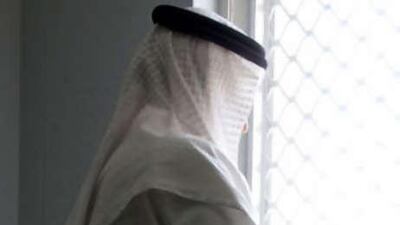Ahmed, a 31-year-old Emirati, has spent the past 10 years in and out of prison for drug-related crimes. Looking at him, you might not know it. He dresses in a gleaming white, perfectly pressed kandoura, and wears designer sunglasses. But his looks are deceiving. His first stint behind bars came when he was just 20 and a regular marijuana smoker. Within the first few months of his sentence, he became caught up in what he says was "everywhere" in the jail - sharing needles to inject heroin.
In 2004, while serving his second sentence, he tested positive for HIV. He is articulate and well spoken, with perfect English, but seems genuinely oblivious to the fact his drug use had put him at huge risk of contracting the disease. "I didn't use hard drugs outside the jail," he insists. "But everything you imagine is in jail, anything you want you can get. I felt very bad. I missed my family, so I injected heroin, and shared needles."
The UN cites intravenous drug use, along with extra-marital heterosexual sex, as the main HIV risk factors for Emirati men. For women it is transmission from her husband. Three years ago, while out of prison, Ahmed married, despite his HIV status. He has since been sentenced to another three years but was released last Ramadan. He now plans to have children with his wife, an expatriate who is free of the virus. He says he has vowed not to return to drugs.
"I have lost everything because of this," he says angrily. "I can't get a job because of this. Nobody will give me a chance. I have got zero." Despite insisting he has come to terms with his HIV, Ahmed does not seem to be able to stop himself venting his frustration at anyone who will listen. His doctor, the prison staff, his "nasty Russian" jailmates, are all subjects of rambling abuse, as if they are to blame for his HIV status. One area where his frustration is possibly well earned is at potential employers who dismiss him on the basis of his health. The law requires UAE nationals to take an HIV test before starting a new job, getting married or having surgery at a government hospital.
Earlier this month, the Council of Ministers approved a law that would make it illegal for employers to discriminate against people with HIV/Aids. Ahmed says he hopes the new rules will allow him to get some normality back in his life. "When they hear you have HIV they say 'bye bye, we'll call you', and they don't. A job is the most important part of it. You can have children but you can't have a job," he says.
Those who contracted HIV through drug use often undergo different treatment. Because of their history with addiction, doctors are reluctant to prescribe them some of the non-essential medicines to ease the symptoms of the antiretroviral drugs. "I can't sleep. It feels like fire in my body but they won't give me anything," he says. "I am not allowed. I am free of drugs. I will never take them again, but [getting] the medicine is difficult." Ahmed says this could be the reason that so many HIV positive Emiratis leave the country for treatment.
According to the UN Progress Report 2010, less than a fifth of local HIV/Aids patients seek treatment in the UAE. Another part of this, according to Ahmed, could be to do with the lack of awareness and psychological support available. "It's very difficult," he says. "Some of the doctors are very good but there is no real help. We take our medicine like people take insulin, but we are treated so differently and there isn't the support there, something I hope will change."
@Email:munderwood@thenational.ae

